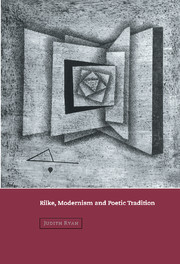Chapter 1 - Fashioning the self
Published online by Cambridge University Press: 22 September 2009
Summary
RILKE'S DRESS
Rilke's earliest poetry is scarcely known to modern readers. Yet his beginnings not only reveal his conscious shaping of a poetic career, they show him absorbing and adapting multiple aspects of the culture around him. He had a good sense of the niches in which a beginning poet could lodge his work, from fashionable Viennese magazines to the souvenir shelf of Prague bookstores. From his emergence as a child prodigy, he situated himself within the framework of a progressively conceived ‘feminine aesthetics’ – today we would speak of an androgynous gender ideal – that was widely fashionable at the time and that continued to resonate throughout his works. His first volume of poems articulates a crisis of marginality common to artistic self-stylisation at the turn of the century. Far from being derivative, Rilke's early verses are in fact an attempt to disengage himself from the clutch of German poetic tradition. By giving his neo-Romanticism a slightly critical edge and thus underscoring his half-affectionate, half-alienated depictions of conventional scenes, Rilke implicitly declares his readiness to embark on a new kind of poetry.
Throughout his development, Rilke follows the cultural interests of his day. His almost seismographic response to fashion in every sense of the word lies at the heart of his early self-styling. He worked hard to attune his projects to current demand and ‘package’ his works to ensure their success.
- Type
- Chapter
- Information
- Rilke, Modernism and Poetic Tradition , pp. 6 - 49Publisher: Cambridge University PressPrint publication year: 1999



